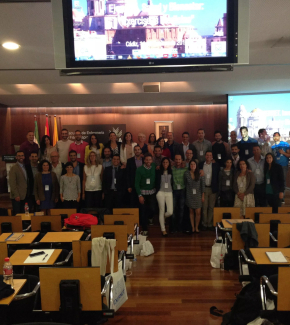
- Led by the University of Granada, the PREFIT project, in which ten Spanish universities are participating, has produced a resource manual to measure the physical fitness of pre-school children and the prevalence of obesity—which affects up to 35% of children in this age range—in a bid to correct risk factors.
A multi-institution project involving ten universities and led by the University of Granada (UGR) has designed a resource manual to measure the physical fitness of pre-school children and the prevalence of obesity—which affects up to 35% of children in this age range—in a bid to correct risk factors.
The PREFIT project (Evaluation of FITness in PRE-School-Age Children), led by researchers from the UGR, has been rolled out across ten Spanish cities to gather data on the physical and anthropometric condition of over 3,000 children aged between 3 and 5 years. “Assessing the physical condition of children aged 3 to 5 years is a challenge, but the fact that they are among the youngest in our society doesn’t mean they are any less important,” explains researcher Francisco B. Ortega. “It was for that very reason that we recognised the need to create a battery of tests to assess their level of physical fitness.”
The study has also gathered data on the prevalence of obesity among pre-school children—a population that, until now, has not been studied due to the lack of a resource manual suitable for this age group.
The participating universities are those of: Cádiz, Almería, Castilla-La Mancha, Navarra, Zaragoza, and Islas Baleares, together with Madrid Complutense, Jaume I (Valencia), and Las Palmas de Gran Canaria.
This joint effort, coordinated from Granada, has evolved into a groundbreaking study that leads the way worldwide in providing fitness data from this population. What is more, the team’s analysis of the data has shown that, even at this early age, there are differences in the level of physical fitness according to gender, which become more marked over the years.
Cristina Cadenas-Sánchez, author of the first study to come out of the PREFIT project, explains: “The project set out to create a method by which to assess the physical condition of such young children by applying a battery of tests specially adapted to their age-group. Our objective was to establish reference values with which to interpret the data we collected in these tests.”
Helping pre-schoolers improve their fitness
Cadenas-Sánchez notes that that the results of the research can help any professional working in the realm of health, sports, and education, because they identify those pre-schoolers with a very low level of physical fitness or those who are worryingly obese—and help them improve.
Childhood obesity is one of the biggest health problems faced by public health systems, both nationally and globally. This study measured its prevalence among pre-school children by analysing the weight, height, body mass index, and waist circumference of over 3,000 children.
The PREFIT study has revealed that the percentage of Spanish pre-school children who are obese or overweight is between 21%—35%, and that 2.5% of the country’s pre-school population now present the most dangerous type—classified ‘morbid’ obesity. Data from the project has helped raise the alarm about the need to implement changes to minimise these obesity rates.
The resource manual that was designed as a result of the project addresses an important gap, in providing guidance on measuring physical fitness and detecting issues of excess weight, specifically tailored to this pre-school population. It has been made freely available to the public, and is already in use in other European and Latin American countries.
PREFIT Project website: http://profith.ugr.es/prefit
Resource manual including protocols, videos, and percentile (‘Fatness and Fitness’) calculator: http://profith.ugr.es/recursos-prefit
Bibliography:
Cadenas-Sanchez C, Intemann T, Labayen I, Peinado AB, Vidal-Conti J, Sanchis-Moysi J, Moliner-Urdiales D, Rodriguez Perez MA, Cañete Garcia-Prieto J, Fernández-Santos JDR, Martinez-Tellez B, Vicente-Rodríguez G, Löf M, Ruiz JR, Ortega FB; PREFIT project group. Physical fitness reference standards for preschool children: The PREFIT project. J Sci Med Sport. 2019 Apr;22(4):430-437. doi: 10.1016/j.jsams.2018.09.227.
Cadenas-Sanchez C, Intemann T, Labayen I, Artero EG, Alvarez-Bueno C, Sanchis-Moysi J, Benito PJ, Beltran-Valls MR, Pérez-Bey A, Sanchez-Delgado G, Palou P, Vicente-Rodríguez G, Moreno LA, Ortega FB; PREFIT project group. Prevalence of severe/morbid obesity and other weight status and anthropometric reference standards in Spanish preschool children: The PREFIT project. Pediatr Res. 2019 Feb 18. doi: 10.1038/s41390-019-0325-8.
Media enquiries:
Cristina Cadenas-Sánchez
PROFITH Research Group
Department of Physical and Sports Education
Email: cadenas@ugr.es
Tel: +34 958 244353
Francisco B. Ortega Porcel
PROFITH Research Group
Department of Physical and Sports Education
Email: ortegaf@ugr.es



